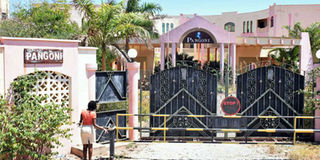Hotels shut doors in face of dwindling business

Pangoni Beach Resort in Shanzu, Mombasa County, remains closed on February 14, 2018. PHOTO | WACHIRA MWANGI | NATION MEDIA GROUP
What you need to know:
- Kenya Association of Hotelkeepers and Caterers executive officer Sam Ikwaye says many hotels at the coast are struggling to stay open.
- Coastal infrastructure is also a major drawback to tourism and general economic potential.
Rusty padlocks and unkempt flowers stare back at you from what was once the lush gardens of Pangoni Hotel in Shanzu, about 20 kilometres from Mombasa, northwards.
Once a glitzy and prestigious apartment hotel frequented by MPs and senior government officials, Pangoni now lies lifeless, abandoned and neglected.
The desolation is not any different at Mombasa Continental Hotel, which is running on empty.
Once a bustling establishment, falling tourist numbers are sounding the death knell on it.
Already, several workers have been laid off to cut the costs of running the hotel.
JOBLESS
In many ways, Mombasa Continental is how resilience looks like in the face of adversity.
Even though business is bad, its gates still remain open.
Many other hotels have closed shop altogether, leaving tens of employees jobless.
Kenya Association of Hotelkeepers and Caterers executive officer Sam Ikwaye says many hotels at the coast are struggling to stay open.
He attributes the change of fortunes to bad politics, which has affected foreign tourist bookings.
“Many hotels in Kilifi are on sale. And in Mombasa, those that have remained open are barely breaking even.
"Hotels should be refurbished often, buy new beds, restock on amenities... if you see one that has gone for seven years without any of these, that’s a red flag,” Mr Ikwaye says.
SGR
However, not all is doom and gloom, as some hotels say they are doing good business, especially since the new railway service to the coast opened up domestic tourism.
At PrideInn Paradise, group managing director Hasnain Noorani says his money comes from local travellers and tourists.
The new railway service, he adds, has boosted his revenue by 20 per cent.
He is looking to capture that market, which has often opted to fly abroad for holidays rather than go to Mombasa.
He attributes this to the notion that accommodation at the Coast is needlessly expensive.
“If you combine the entire package of flights and accommodation in Dubai, then holidaying here is much cheaper.
"Our rates sometimes soar, not because we want to scam our customers, but because the cost of setting up these businesses is very high.”
COST OF BUSINESS
Building a four-star hotel with more than 150 rooms, he says, costs around Sh3 billion.
“The cost of financing in Kenya is quite high compared to European countries.”
Coastal infrastructure is also a major drawback to tourism and general economic potential.
Some roads are in poor state while traffic jams have become the order of the day.
To survive all these, and particularly move away from the choking grip of dwindling foreign tourism, investors are marketing themselves as Mice centres — Meetings, Incentives, Conventions, and Events.
This type of tourism comes in large groups, is usually planned in advance, and therefore hotels can be assured of occupancy.





